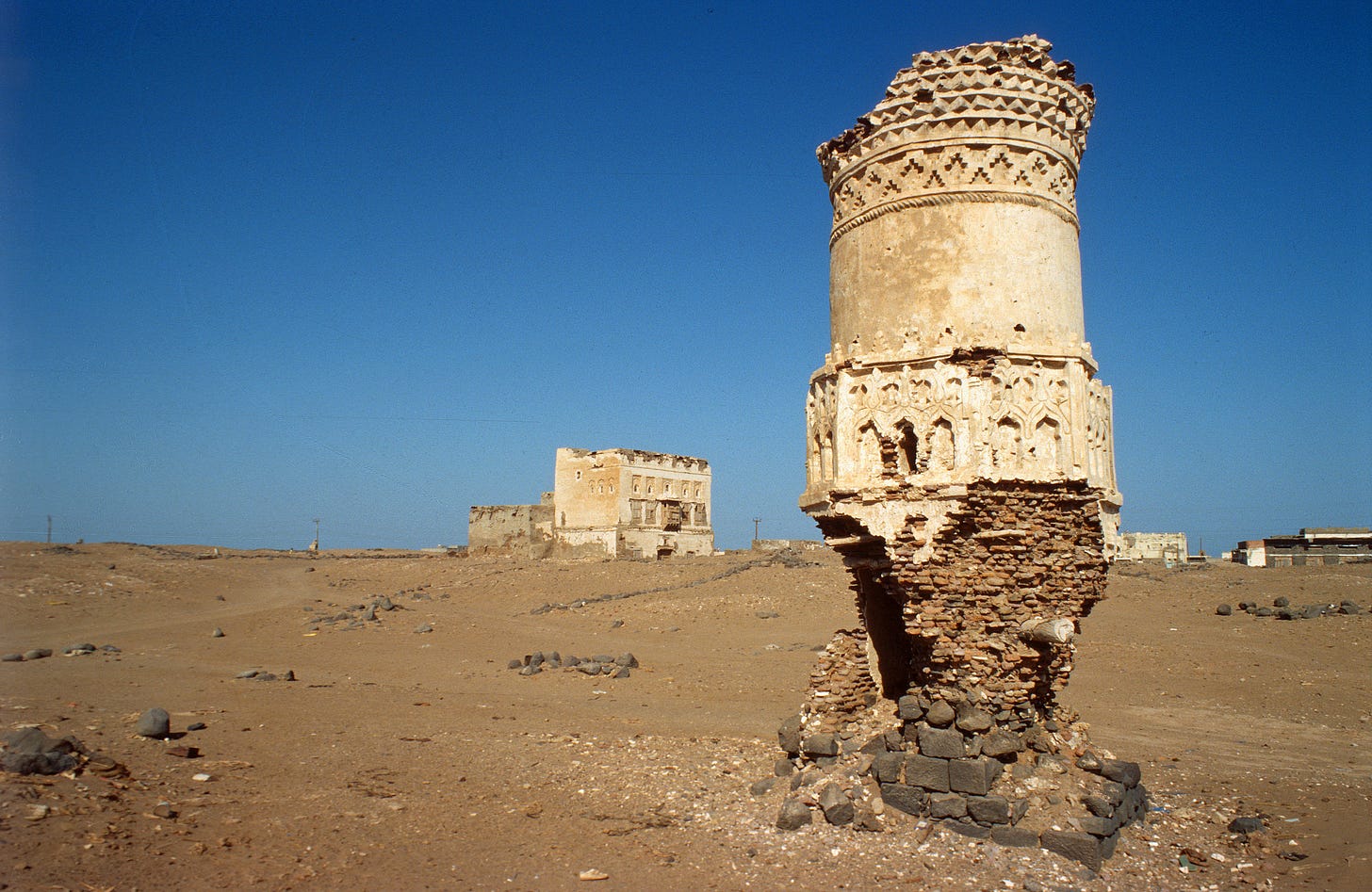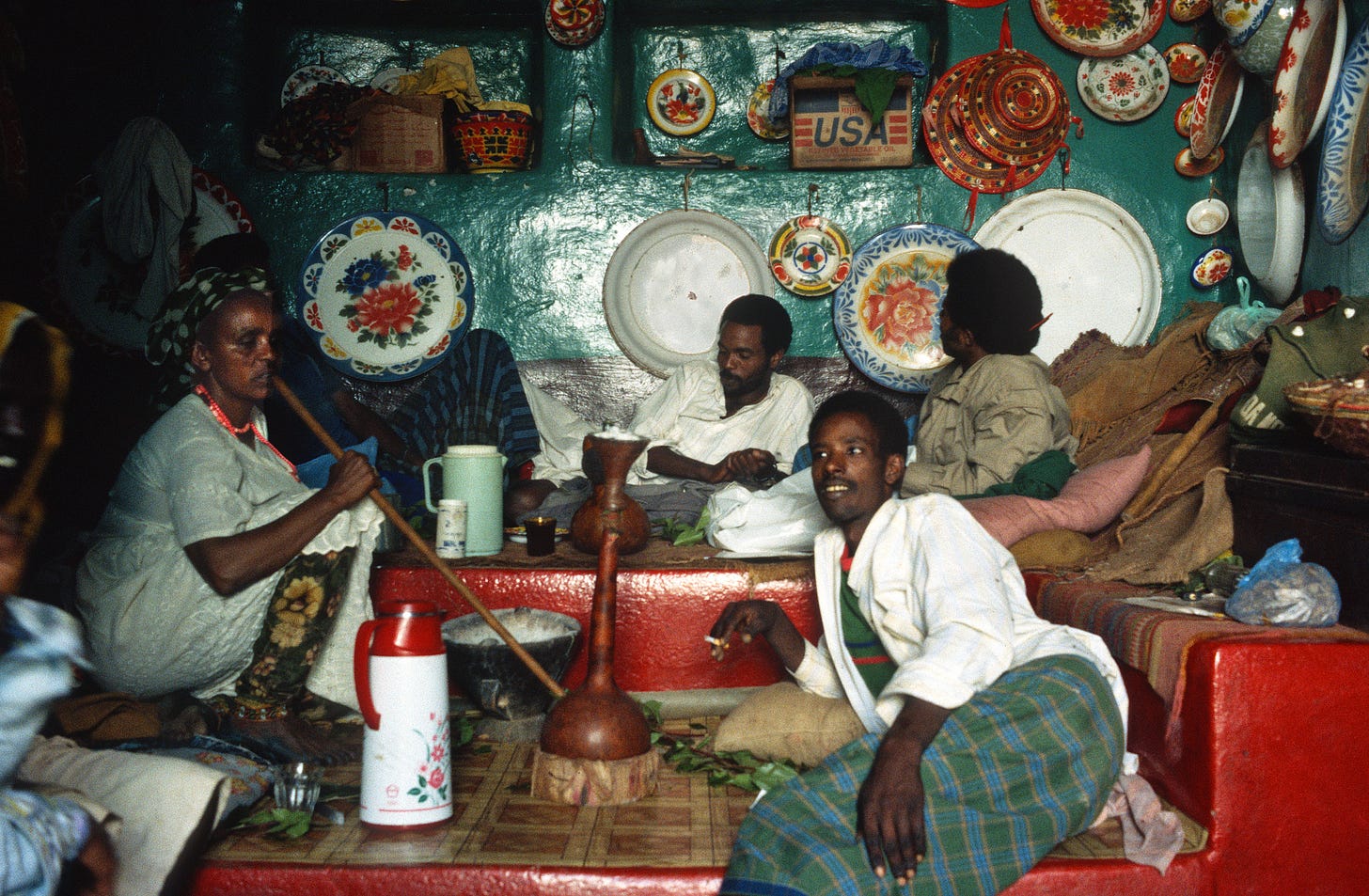7 December 2021: The Daily Mirror alleges there was an illegal Christmas party at Number 10, Downing Street, in 2020. A video appears to show Boris Johnson's senior aides struggling to handle an awkward secret. There are many awkward secrets in Westminster.
13 November 2021: During a routine inspection of my coffee plantation (two potted plants on a windowsill), I notice three full-sized coffee berries. Are they the first ever produced in Wales? I like to think so.
30 December 2020: Tory MP Bill Cash compares Boris Johnson to Alexander the Great. He means this as a compliment.
24 June 2014: The UK government bans the drug qat (also known as khat, chat and miraa) a leaf grown in Ethiopia, Yemen and Kenya.
My first experience of the drug’s power was in 1982. I'd sat down on a stool under a simple shade of sackcloth in a Sudanese market. There were a few other customers. I took a couple of shots and felt my blood pressure drop and heart speed up. I started chatting energetically to anyone nearby, then called for more, and more. The owner was surprised, but delivered. After an hour I stood up and attempted to walk away.
For some reason the sun then dived for cover. A pole holding up the sunshade hit me on the head. My knees buckled and I flumped down. I was in cold sweat and my head was spinning. That night I had no sleep at all, but plenty of dreams. I had learned, the hard way, that over-consumption of any drug can have unfortunate consequences, including this one: coffee.
There is a story that coffee was discovered by a goatherd in the Ethiopian mountains who watched his animals capering wildly after browsing on some particular red berries. The story gets trotted out in most historical accounts of the world's favourite beverage, but there is something significant that is missing, something those tales always leave out, something I first heard in Ethiopia in 1994.
I was making my way from Addis Ababa towards the Eritrean port of Assab, hoping to find a boat over to Yemen which was in a state of war. There were no flights and I was in a hurry to arrive before hostilities ended, otherwise I'd have a problem with the magazine that had sent me, in particular their $3,000 advance. And yet, there was a Siren voice calling me away from my primary goal. On a bus heading towards the Eritrean border, a fellow passenger waxed lyrical about a fabulous walled city in the hills that I really had to see. A couple of days seemed not too great a sacrifice.
Harar is now a UNESCO World Heritage site, but in those days it felt neglected. Hyenas prowled the streets at night. A baby had been ripped from a woman’s back and other nocturnal strollers severely wounded. Walking through, in daylight hours, I was invited to drink coffee and found myself inside a fabulous old house, a labyrinth of halls, steps and rooms that led into a spacious inner chamber. Here the walls were painted green and covered in colourful enamel plates that had been nailed up as decoration. Lounging on stone benches covered in cushions, we ate lunch off a huge communal tray - flat bread and spicy meat sauce - then drank tiny shots of sweet coffee as thick as treacle.
It was then that they told me their version of how coffee was discovered, a far more extraordinary tale than the one you read in Wikipedia.
It begins with a shepherd living in the mountains of Abyssinia. He hears about a great man, the greatest of the age, a charismatic leader who has swept across half the planet, leaving a trail of glory and chaos. The poor shepherd is determined to travel as far as necessary in order to see this wonderful being who is none other than Alexander the Great.
To catch up with Alexander is difficult. The great man is hard to pin down. However, the shepherd eventually locates the emperor's hideaway, a luxurious palace that he is borrowing from some local lord. The shepherd creeps up to the doors and peeps through the crack.
At first he sees only women and children, but eventually the great man, the Scourge of Large Neighbouring Continents and Conqueror of Afghanistan, strolls into view. He is relaxed, not wearing his usual war helmet, and without the artful ringlets of golden hair reserved for public appearances. But what the shepherd sees makes him gasp and fall back in horror. Then he turns and runs. What he has witnessed is the appalling secret at the very heart of the empire, something that will now change his own life forever. The emperor has horns.
Knowing how dangerous this secret must be, and that it will be very hard to keep, the shepherd does what all confidantes of high office do in similar circumstances, he rushes back home. But still unable to settle, eaten up by the knowledge that Alexander has grown a pair of devilish skull ornaments, he then travels far into the Abyssinian mountains. When he gets high up in the clouds, he digs a deep hole and crouching down, whispers into it: "The emperor has horns." He then immediately fills the hole and walks away, satisfied. The secret has been buried.
For a while the stratagem seems to work. In time, however, obsessive anxieties begin to gnaw away at the shepherd. Has he hidden the place well? Has anyone discovered it? He cannot stop worrying. And so he goes back.
To his surprise, when he reaches the precise location, he finds two beautiful trees growing where the awful secret was buried. Not only that but wild animals are eating both the foliage of one tree and the berries of the other. He tries both himself and finds the effects pleasurable. He takes some back and shares them. Soon the shepherd and his friends are holding an afternoon session where poetry is recited, music played, and old memories tickled. The shepherd finds himself totally relaxed and talkative. In a moment of inattention and fuelled by new drugs, he lets slip the emperor's secret. Alexander has horns. A horrified silence falls. The sun is setting and now the mood darkens too. Everyone present, everyone who knows the secret, now feels in danger.

Back in the Harar house, with this story told, my hosts now fetched some bundles of qat, long stems with bright green leaves and shoots. This was the second tree of the story, the lesser-known cousin of the coffee. We began to chew. I was not a newcomer to this: I'd chewed the leaves many times before and knew what to expect. Nothing. At least not for a while. But then as my body relaxed, my mind seemed to wake up. Conversation fluttered into life and tumbled forward in a great jumble of stories and laughter. They talked about Dhu al-Qarnein, the Father of the Two Horns, mentioned in the Qur’an and often thought to be Alexander.
Later, when the sun set, our happy chatter slipped away into contented silence. The others were, no doubt, contemplating the deep mystery of horned rulers, a constant theme in human history, suggesting unholy alliances between dark forces. But not me: I was worrying about the hyenas.
I said goodbye to my hosts. Qat does not make you spin and fall over like coffee can, but it does leave you with a similar edgy insomnia. I set off back to my hotel, a good two miles away. It was already dark and the streets empty. I knew lots of memorable facts about hyenas, like how they have a bite strength three times more powerful than a rottweiler. The road was long, tree-lined and straight. I did the entire walk in fear of being attacked, but no hyenas appeared.
Both qat and coffee were carried across the Red Sea eventually and planted successfully in Yemen, but the careers of these two mildly psychoactive plants then diverged. Coffee did not catch on as a drink in Yemen. Instead they made a tea, qishr, from the berry husks (it's still popular in the country). The beans were exported to Istanbul where the drink had become fashionable. Within a few years European merchants arrived off the Yemeni port of Mokha, also wanting to buy coffee. By the end of the 17th century they had smuggled seeds out the country and planted them in Ceylon and Java. Yemen's near monopoly was finished and Mokha fell into ruin. Once coffee reached Brazil it was a runaway success. Nowadays, when travelling in the UK, it is mandatory to carry a cup of the stuff.

Qat's career path was very different. The leaves need to be fresh and so it never spread far from its homelands, not until the arrival of international air transport. By then, the chewing of a bunch of leaves to get mildly high was not seen as an attractive prospect. The Somali War in the 1990s exposed viewers of television news to the sight of skinny, dishevelled fighters brandishing Kalashnikovs and M16s, their cheeks bulging with qat. It was clearly a serious drug that drove men mad with bloodlust. Soon after that, most of the world banned it.
Three years after that first visit to Harar, I was back, and staying in the same hotel. I couldn't find the people I had met on that first visit, but made friends with others. I chewed qat inside the old city and once again I found myself walking home alone late at night through deserted streets. I must have been within two hundred yards of the hotel gate when a blood-curdling howl made me leap in the air. I looked back and there was a hyena loping towards me, a huge bristling monster with a maniacal grin and terrifying jaws. In situations like this it is vital to stay calm, avoid eye contact and make sure that you are walking with someone who is slower than yourself. I was alone. I ran.
It's only now, many years later, that I wonder if all the caffeine and qat in my system actually saved me that night. In one incredible leap I cleared the six-foot high iron gate to the hotel, and gave the night watchman a nasty surprise.
The two coffee trees on my window ledge are in reasonable health. They live indoors during winter and when I remember, I spray them with cool water in the morning, a reminder of their origins in an African cloud forest. I never tell them any secrets.







Turkmen people (Türkmenistan) have a similar story on Alexander the great. After part where goatherd screams to the hollow takes a different route. After a year when goatherd visits the hollow (it is a well - guýy in Turkmen story), reeds have grown out of it. Then goatherd makes flute from the Reed. When he plays it, flute sound starts to tell people Alexander the Great has horns.
thank you for the two tales, yours and your hosts’
I am left wondering if there is any overlap with the strange error in translation that left Michaelangelo to sculpt Moses with two devilish horns.
The popular theory is that the bible meant to refer to rays of light or some other figure of speech, but perhaps there are other reasons to represent a great leader as having horns?